American Rocketry Challenge
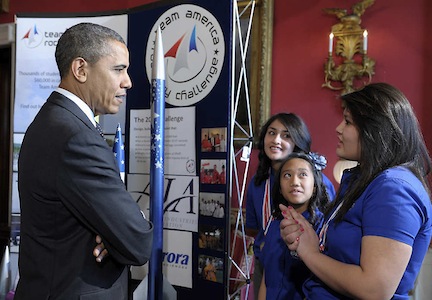 The American Rocketry Challenge (ARC) is an aerospace design and engineering event for teams of US secondary school students (6th through 12th grades) run by the NAR and the Aerospace Industries Association (AIA). Teams can be sponsored by schools or by nonprofit youth organizations such as Scouts, 4-H, or Civil Air Patrol (but not the NAR or other rocketry organizations). The goal of ARC is to motivate students to pursue aerospace as an exciting career field, and it is co-sponsored by the American Association of Physics Teachers, Estes Industries, the Department of Defense, the Federal Aviation Administration, and NASA. The event involves designing and building a model rocket (650 grams or less in weight, 650 millimeters or more in length using NAR-certified model rocket motors totaling 80 N-sec or less of total impulse) that carries a payload of two Grade A Large eggs for a flight duration of 41-44 seconds, and to an altitude of exactly 790 feet (measured by an onboard altimeter), and that then returns the egg to earth safely by parachute, without cracking it. Onboard autonomous control systems are allowed; radio-control and pyrotechnic charges are not.
The American Rocketry Challenge (ARC) is an aerospace design and engineering event for teams of US secondary school students (6th through 12th grades) run by the NAR and the Aerospace Industries Association (AIA). Teams can be sponsored by schools or by nonprofit youth organizations such as Scouts, 4-H, or Civil Air Patrol (but not the NAR or other rocketry organizations). The goal of ARC is to motivate students to pursue aerospace as an exciting career field, and it is co-sponsored by the American Association of Physics Teachers, Estes Industries, the Department of Defense, the Federal Aviation Administration, and NASA. The event involves designing and building a model rocket (650 grams or less in weight, 650 millimeters or more in length using NAR-certified model rocket motors totaling 80 N-sec or less of total impulse) that carries a payload of two Grade A Large eggs for a flight duration of 41-44 seconds, and to an altitude of exactly 790 feet (measured by an onboard altimeter), and that then returns the egg to earth safely by parachute, without cracking it. Onboard autonomous control systems are allowed; radio-control and pyrotechnic charges are not.
ARC is in its 23rd year — ARC 2025. It is the largest model rocket contest ever held. Co-sponsored by the NAR and the Aerospace Industries Association (AIA), the first 21 years of TARC together attracted 16,149 middle & high-school teams made up of a total of over 95,000 students from all 50 states. These students had a serious interest in learning about aerospace design and engineering through model rocketry. The top 100 teams each year come to a final fly-off competition held in mid-May near Washington, DC, to compete for $100,000 in prizes and a free trip to either the Paris or the Farnborough (England) air show in Europe (Farnborough in even years, Paris in odd years). These teams are selected based on the scores reported from qualification flights that they conduct locally throughout the US by April 7, 2025
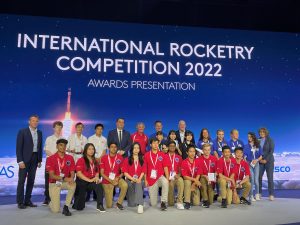
Read about the ARC 2023 National Finals in this Sport Rocketry Article on ARC 2023: ARC in NAR Sport Rocketry (Sep 2023)
Check out this great ARC promotional video about the ARC 2023 Finals from the NAR’s AIA partners.
The entry forms, rules, and other details about ARC 2025 are posted on the AIA’s website. The most recent version of the rules and the team handbook is posted at the bottom of this page. Event registration for ARC 2025 will open in June 2024. The ARC 2025 National Finals will be held on May 17, 2025 at its normal site, the Great Meadow facility in The Plains, VA (45 miles west of Washington, DC).
NAR Support for ARC
The NAR asks all of its Senior (adult) members and its Sections to take an active role in supporting ARC. This event offers a tremendously rewarding opportunity to teach rocketry skills to bright and enthusiastic young people and to “pay forward” to a new generation of rocketeers for the support that we once received from others when we were starting out in the hobby. Please use the Publicity Handout attached at the bottom of this page to get the word out about the ARC. Individual NAR Senior (adult) members can help by being a “mentor” or a “qualification flight observer” (or both).
Mentors are adult (age 21 and above) members of the NAR who volunteer to serve as technical advisors and instructors or coaches to ARC teams. Each team has a school teacher as an advisor; not all of them know much about such rocketry skills as staging and clustering. The role of the mentor is to get teams over the initial learning hump of mastering basic rocketry skills; they are not allowed to help teams with their final contest designs. Mentors may also serve as “qualification flight observers.” See the excellent lessons-learned presentation below for advice on mentoring.
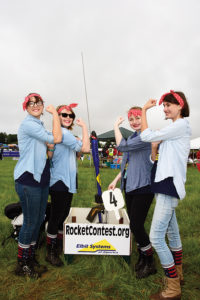
If you want to volunteer as a NAR Mentor, email NAR ARC Manager Trip Barber.
Qualification flight observers are adult members of the NAR who watch a team’s official “qualification flight” attempt at a mutually convenient time and place sometime before April 7, 2025. The observer verifies that the flight is conducted within event rules and that the egg payload is uncracked after flight, serves as one of the two stopwatch-equipped timers for the flight, and then records the flight duration and altimeter-reported altitude post-flight. He or she signs the official flight-report form, which is then sent in to the AIA. Qualification flight observers are under no obligation to also serve as a mentor to a team, although they may do so. Observers must be impartial; they cannot be related to any member of the team they observe, be employed by the team’s school, or be a member of the team’s sponsoring non-profit organization. Impartial adults may join the NAR (online if desired) simply for the purpose of being an observer, if a team is not otherwise able to locate an NAR adult member. The responsibilities and procedures for being an NAR mentor or observer are explained in our Mentor and Observer Guidelines below. The form to use in observing an ARC qualification flight is also posted below.
NAR Sections can help by listing all of their launches on the NAR “Launch Windows” web page and by providing free access to these launches and use of Section or personal launch equipment for any team that needs to do a test or qualification flight. For a current list of NAR rocket launches, see our “Launch Windows” web page.
Only certain NAR-certified model rocket motors of total impulse class “F” and below are approved for flight use in ARC – those in current production that are not classified as “high power” per NFPA due to very high thrust or sparky propellant. The list of those that are approved is posted below.
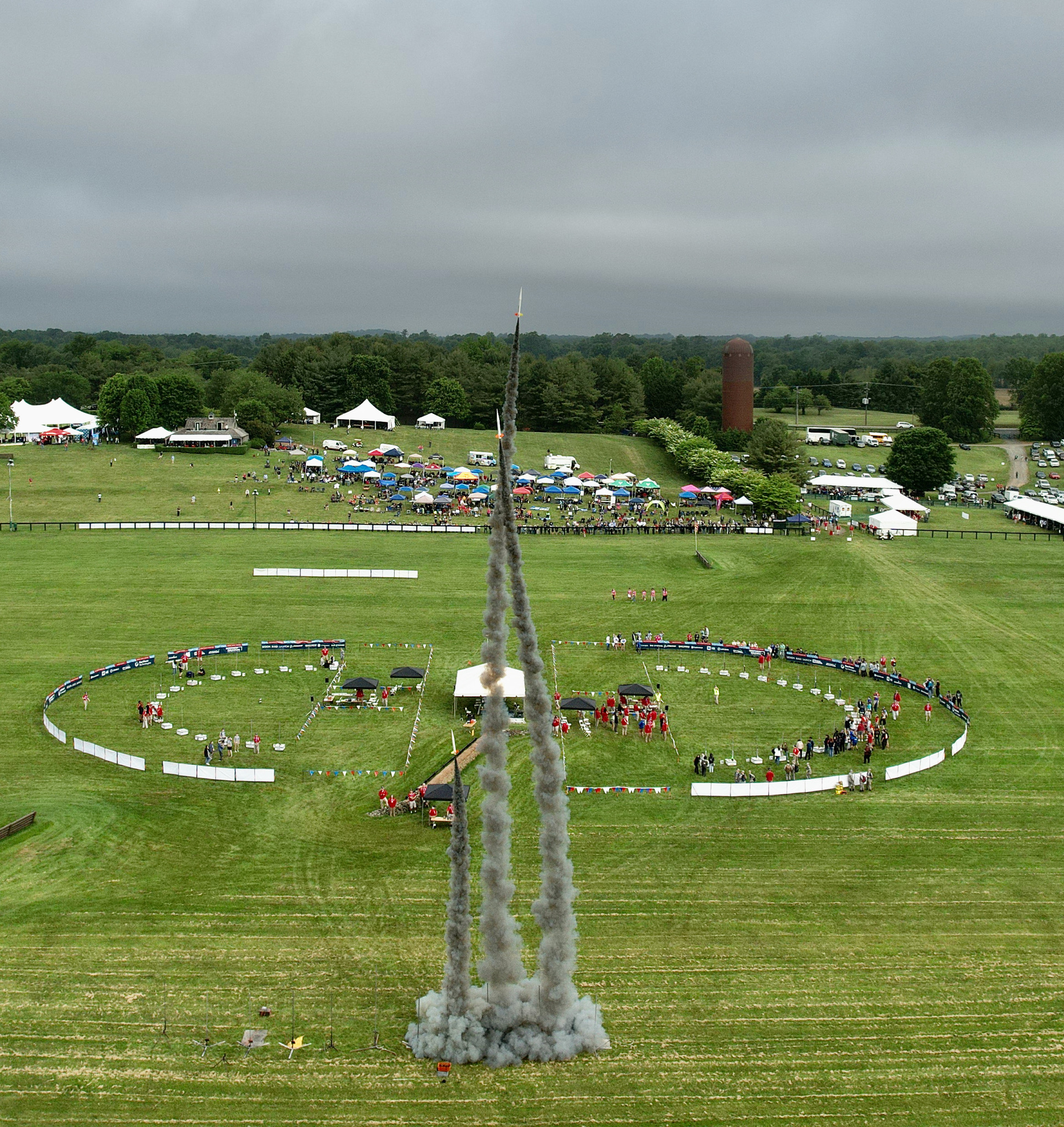
Recognition for the NAR from ARC
The NAR and our ARC partners at the Aerospace Industries Association have received all five of the most prestigious national and international awards there are for aerospace education and outreach because of what all of us have done in making TARC succeed:
2012 Aviation Week & Space Technology Laureate Award for Workforce
2013 National Aeronautic Association Frank Brewer Trophy for aerospace education
2015 National Coalition of Aerospace Educators Mervin Strickler Award for aerospace educational outreach
2016 Federation Aeronautique Internationale Frank Ehling Diploma for aerospace educational outreach
2020 National Aviation Hall of Fame Spirit of Flight Award for sustained aerospace educational outreach
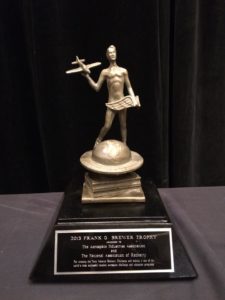 NAA Brewer Trophy
NAA Brewer Trophy
NAR Site Owner Insurance
ARC teams that need “site owner insurance” (insurance which protects the owner of the land used for a rocket launch) in order to gain access to a flying site for their local test and qualification flights may get this through the NAR, by chartering as an NAR “organizational” section. This insurance is available only for actual landowners (including schools and school boards), not for school officials who are concerned about personal liability. The teacher supervisor must be a member of the NAR, and at least one student team member must also be a member of the NAR. You can apply for a section charter here.
NAR Membership for Students in ARC Teams
Students who are members of a registered ARC team may join the NAR at the “family member” rate ($20 rather than the normal Junior rate of $30) if their adult teacher is a regular full member of the NAR. Only the teacher will receive the bimonthly NAR magazine, Sport Rocketry. This membership option is not available online, please call NAR Headquarters at 319-373-8910.
Related Documents:
| ARC 2025 Handbook | May 26, 2024, 10:52 pm | 2 MB | |
| Mentor and Observer Guidelines 2025 | May 26, 2024, 12:40 pm | 139 KB | |
| ARC Publicity Handout - 2025 | May 26, 2024, 12:41 pm | 218 KB | |
| Event Rules - ARC 2025 | May 26, 2024, 12:15 pm | 647 KB | |
| ARC 2025 Qualification Flight Report Form | May 26, 2024, 12:15 pm | 108 KB | |
| Rocket Motors Approved for ARC 2025 | May 26, 2024, 12:15 pm | 158 KB | |
| Flight Testing | October 10, 2019, 2:32 am | 3 MB | |
| Parts for an ARC Rocket | November 19, 2019, 2:10 am | 262 KB | |
| St Monica Homeschool Presentation - 1st Place in ARC 2024 Presentation Competition | May 26, 2024, 12:42 pm | 2 MB | |
| TARC Lessons Learned - Pinkas (Jan 2021) | November 21, 2021, 4:38 pm | 4 MB | |
| ARC 2024 Results | May 26, 2024, 12:43 pm | 126 KB |
